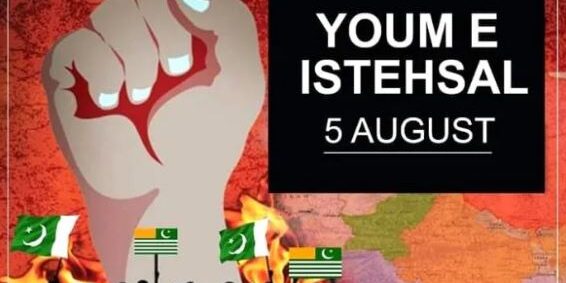Stolen Freedom: The Plight of Kashmir
On the 5th of August, the people of Jammu and Kashmir observe Youm-e-Istehsal, a day that marks the tragic events that unfolded in 2019. Before August 5th, 2019, Jammu and Kashmir enjoyed a degree of autonomy under Article 370 and Article 35A of the Indian Constitution. These articles granted the region special rights, including its constitution, a separate flag, and the power to enact its laws. They also restricted outsiders from purchasing property or settling permanently in Kashmir, aiming to preserve the region’s unique demographic and cultural identity. It was on this day that the Indian government unilaterally abrogated Article 370 of the Indian Constitution, stripping the region of its special status and autonomy. The Indian government revoked these articles and this move not only challenged the sovereignty of the people of Jammu and Kashmir but also intensified the long-standing conflict and human rights issues in the region.
This article aims to shed light on the significance of Youm-e-Istehsal, present statistical data to highlight the issues by the people and propose potential solutions for a peaceful resolution. Youm-e-Istehsal serves as a day of remembrance, reflection, and resilience for the people of Jammu and Kashmir. It is a solemn occasion to honor the lives lost, the struggles endured, and the resilience shown by the Kashmiri people. This day also provides an opportunity to raise awareness about the ongoing human rights violations, political repression, and socio-economic challenges faced by the people of the region. Since the abrogation of Article 370, reports of human rights abuses in Jammu and Kashmir have increased significantly. Following the revocation, a communications blackout and strict security measures were imposed in Jammu and Kashmir. Thousands were detained, including political leaders, activists, and ordinary citizens. According to Amnesty International Report (2023), there has been a surge in cases of extrajudicial killings, arbitrary detentions, torture, and enforced disappearances. Victims endure severe torture, often facing death or living in constant fear of it. They are isolated from their families and with little hope of rescue, they suffer immense physical and emotional trauma. Even if they survive and are eventually freed, the physical and psychological wounds remain with them permanently. The UN Office of the High Commissioner for Human Rights has also expressed concerns over the excessive use of force and the lack of accountability for these violations.
The Indian government’s decision to impose frequent communication blockades and internet shutdowns has severely impacted the daily lives of the people in Jammu and Kashmir. It has hindered access to vital services, disrupted education, and impeded economic growth. In August 2019, the Indian government imposed a complete communications blackout on Jammu and Kashmir, cutting off all phone and internet services (Bajoria, 2023) According to the Voice of America Report, Jammu and Kashmir witnessed the highest number of internet shutdowns in India in 2022. The abrogation of Article 370 has had a detrimental impact on the economy of Jammu and Kashmir. Curfews, restrictions on movement, and a general sense of insecurity have severely hampered business activity and tourism. A 2020 report by the Kashmir Chamber of Commerce and Industry (KCCI) estimated that the region’s economy had suffered losses exceeding $5 billion due to the ongoing situation. The prolonged closure of educational institutions and restrictions on movement have also affected livelihoods and employment opportunities, leading to increased poverty and economic uncertainty.
A peaceful resolution to the Kashmir conflict can only be achieved through meaningful dialogue and diplomacy. All stakeholders must come together to engage in constructive discussions and negotiate a solution that respects the aspirations and rights of the people of Jammu and Kashmir. Restoring the special status and autonomy of Jammu and Kashmir, as guaranteed under Article 370, can help rebuild trust and create an environment conducive to peace and stability. This can be achieved by allowing the people of the region to participate in decision-making processes and ensuring their rights to self-determination.
The Indian government must ensure accountability for human rights violations by conducting impartial investigations and prosecuting those responsible. Establishing an independent mechanism to monitor and document human rights abuses can help build confidence and restore faith in the justice system. The international community can play a crucial role in facilitating a peaceful resolution to the Kashmir issue. By urging India to respect the human rights of Kashmiris and engaging in meaningful dialogue with all stakeholders, the international community can help pave the way for a lasting peace. UN-supervised plebiscite could allow Kashmiris to determine their future through a free and fair vote.
To conclude, Youm-e-Istehsal is a day that reminds us of the struggles faced by the people of Jammu and Kashmir and the urgent need for a peaceful resolution to the conflict. The statistical data presented in this article highlights the human rights violations and socio-economic challenges faced by the region. By embracing dialogue, restoring autonomy, and ensuring human rights accountability, we can take steps towards a just and lasting solution. As we observe Youm-e-Istehsal, let us stand in solidarity with the people of Jammu and Kashmir and work towards a future of peace, justice, and prosperity for all.
The writer Aneesa is a Social Activist from AJK.
References
Bajoria, J. (2023). “No Internet Means No Work, No Pay, No Food.” https://www.hrw.org/report/2023/06/14/no-internet-means-no-work-no-pay-no-food/internet-shutdowns-deny-access-basic (Retrieved: 23rd July, 2024)
Hussain, B. (2023). Kashmir Registers Highest Number of Internet Restrictions Globally. https://www.voanews.com/a/kashmir-registers-highest-number-of-internet-restrictions-globally-/6958516.html (Retrieved: 23rd July, 2024)
- January 26: Kashmir’s Black Day - January 26, 2026
- Unfulfilled Promise of Self-Determination in IIOJK - January 22, 2026
- Socio-Economic Transformation in Kashmir, Post-Article 370: Never Ending Anxieties Of Kashmiris - December 23, 2025







